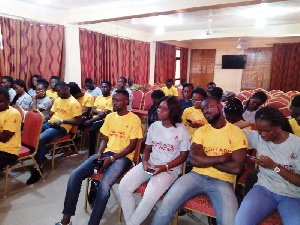Students from the School of Performing Arts, University of Ghana-Legon have undertaken an HIV and AIDS awareness and sex education plus campaign in the Wa municipality of Upper West Region.
The community development project initiative carried out by the students was in partnership with the Technical Support Unit (TSU) of the Ghana AIDS Commission.
The Project Manager, Mr Asante Kwasi Afum, told a gathering in Wa that the project was very vital because it partially fulfilled the requirements of final year students studying Theatre for Development.
According to the project reports, Ghana’s HIV prevalence rate is generally low and varies from region to region and within communities.
But, Mr Afum said despite efforts by the Ghana AIDS Commission and partners to tame the HIV/AIDs national response epidemic, major challenges still exist.
The Project established that comprehensive knowledge about HIV was low among Ghanaians. It decreased from 25 percent to 18 percent among women and 33 percent to 30 percent among men from 2008 to 2014 respectively, according to Ghana Demographic and Health Survey, 2014.
It also revealed that condom use at last sexual activity among men aged 15 – 49 who have two or more partners decreased from 26 percent in 2008 to 19 percent in 2014, with only 11 percent using condom during their last sexual encounter.
However, 92 percent of female sex workers (FSWs) used a condom during their most recent sexual intercourse with paying clients, reports the integrated biological and behavioural surveillance survey, 2011.
According to the 2016 HIV Sentinel Survey (HSS, 2016), HIV prevalence has increased from 1.3 percent in 2014 to 2.5 percent in 2016 in the Upper West Region.
“This has pointed to the need to increase collective efforts to halt the increasing trend in the Region,” Mr Afum said.
“It is in this regard that AIDS Awareness and sex education plus in Wa was conceived to partner with the Ghana AIDS Commission TSU in the region to undertake a three-day programme of activities to sensitize the people of Wa on HIV and AIDS”, he added.
“It is envisaged that this project will accelerate our collective national campaign to get 90 percent of people living with HIV to test to know their HIV status, in line with the UNAIDS global 90-90-90 fast track targets.”
The activities rolled out commence with media briefing, documentary on wheels, radio discussion as well as free health screening alongside sensitization on HIV and safe sex practice.
General News of Friday, 2 March 2018
Source: ghananewsagency.org













